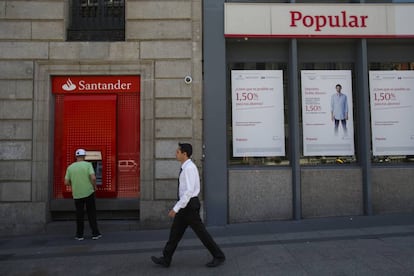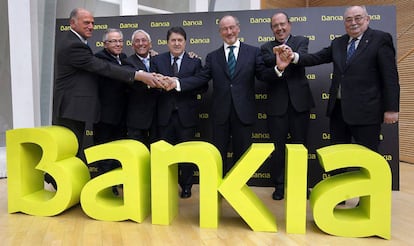Claims lawyers see lucrative market in Popular’s disgruntled shareholders
Investors who lost everything in the Santander takeover may be the next big thing for law firms
Banco Popular shareholders awoke on Wednesday to the unpleasant news that their investment had vanished into thin air following the struggling bank’s takeover by Santander for the symbolic amount of one euro.

Until Thursday of last week, Popular shares had been trading normally – if down again for the eighth consecutive day. The bank had lost 50% of its value in just one week, evidencing massive share sales in recent days.
But Popular still had around 300,000 investors. Now, they are 300,000 angry investors.
Some cases could be open to legal claims. This is the case with shareholders who participated in the May 2016 capital increase
LEAN Abogados
And this could potentially mean business for law firms specializing in claims and class-action litigation.
For several years now, these lawyers have been having a field day with all the recent banking abuses – from the Bankia preference share scandal to the mortgage “floor clause” fallout.
As early as Wednesday afternoon, specialized lawyers were speaking on the radio to offer their services to shareholders wanting to claim their money back.
Un-Popular decisions
Forty years ago, right before Spain held its first democratic election following the Franco dictatorship, Banco Popular announced the shocking news that it was lending money to the Spanish Communist Party (PCE) to fund its campaign. The party had only become legal two months earlier, and banks as a whole were keeping it at arm’s length. To top it all off, Popular’s chairman, Luis Valls-Taberner, was a member of the conservative Catholic group Opus Dei.
It was not the first time that Valls had swum against the tide. Not long before that, he had refused to contribute money to create an industry association, the CEE, which would go on to merge with today’s employer association, the CEOE. The Popular was the only one of the Big Seven to refuse. Of those seven – Banesto, Central, Hispano Americano, Bilbao, Vizcaya, Popular and Santander – there are only two left standing today. The Basque banks merged and later incorporated Argentaria, to become BBVA. And Santander took over the first three in the 1990s – and the Popular this week.
Law firms have deployed an array of tools to attract clients, from ads and press releases, to information sessions.
Arriaga Asociados has updated its website to include an article on how the takeover might affect Popular shareholders.
“We are currently analyzing all the options to recover the investment made by shareholders involved in the capital increase of 2016. We encourage you to fill in the following form to keep abreast of developments regarding a possible claim,” it states.
Meanwhile, LEAN Abogados, an association of law firms specializing in banking law, was scheduled to hold an information session at 11am on Thursday. This group admits that “the bulk of investors will not get their capital back,” but points to a possible loophole in the process.
“Some cases could be open to legal claims. This is the case with shareholders who participated in the May 2016 capital increase,” says LEAN partner Ignacio de Azúa. “The reason is that the accounts that were used for the increase were inaccurate.”
Meanwhile, the OCU consumer association has announced that it is “considering legal action to defend Popular’s small shareholders.” This group is also preparing an information campaign for affected investors.
And Asufin, an association of financial consumers, said it is in talks with specialized lawyers and financial experts to file a legal claim against Popular’s management team.
The Spanish Association of Minority Shareholders in Listed Companies (Aemec), called the takeover “an expropriation” and said it is also considering action against Popular’s board, whose chairman is Emilio Saracho.

In April of this year, Aemec had already asked the stock market watchdog, the CNMV, to investigate whether Popular’s Mexican stakeholder, Antonio del Valle, had violated market regulations. This association also held that Chairman Saracho’s statements at a shareholders meeting had led to a collapse in share value, “leading numerous shareholders to ruin.”
Meanwhile, a website has gone up under the name “afectadosbancopopular” (victims of banco popular), encouraging shareholders to come together in legal action against the bank. The site suggests filling out a form. At the bottom of the page, there is a note explaining that the initiative “has the legal backing of RÚA Abogados, a law firm specializing in banking law, with more than 40 years’ experience and 98.9% of favorable judicial decisions in the defense of plaintiffs affected by bad bank practices.”
Bankia and mortgage fees
The Popular takeover fallout could represent a new seam in the goldmine that law firms discovered long ago, after helping thousands of Bankia investors who were affected by the bank’s IPO, which was based on inaccurate financial information. Lawyers made millions of euros after banks were forced to pay their fees after losing in court.
This spawned a thriving claims industry, pushing Bankia to offer express refunds to investors and save itself the money. Lawyers also targeted the preferred shares scandal.
Then, the mortgage “floor clause” issue came along, leading to thousands of court cases despite the government’s drive for out-of-court settlements.
English version by Susana Urra.
Tu suscripción se está usando en otro dispositivo
¿Quieres añadir otro usuario a tu suscripción?
Si continúas leyendo en este dispositivo, no se podrá leer en el otro.
FlechaTu suscripción se está usando en otro dispositivo y solo puedes acceder a EL PAÍS desde un dispositivo a la vez.
Si quieres compartir tu cuenta, cambia tu suscripción a la modalidad Premium, así podrás añadir otro usuario. Cada uno accederá con su propia cuenta de email, lo que os permitirá personalizar vuestra experiencia en EL PAÍS.
¿Tienes una suscripción de empresa? Accede aquí para contratar más cuentas.
En el caso de no saber quién está usando tu cuenta, te recomendamos cambiar tu contraseña aquí.
Si decides continuar compartiendo tu cuenta, este mensaje se mostrará en tu dispositivo y en el de la otra persona que está usando tu cuenta de forma indefinida, afectando a tu experiencia de lectura. Puedes consultar aquí los términos y condiciones de la suscripción digital.








































